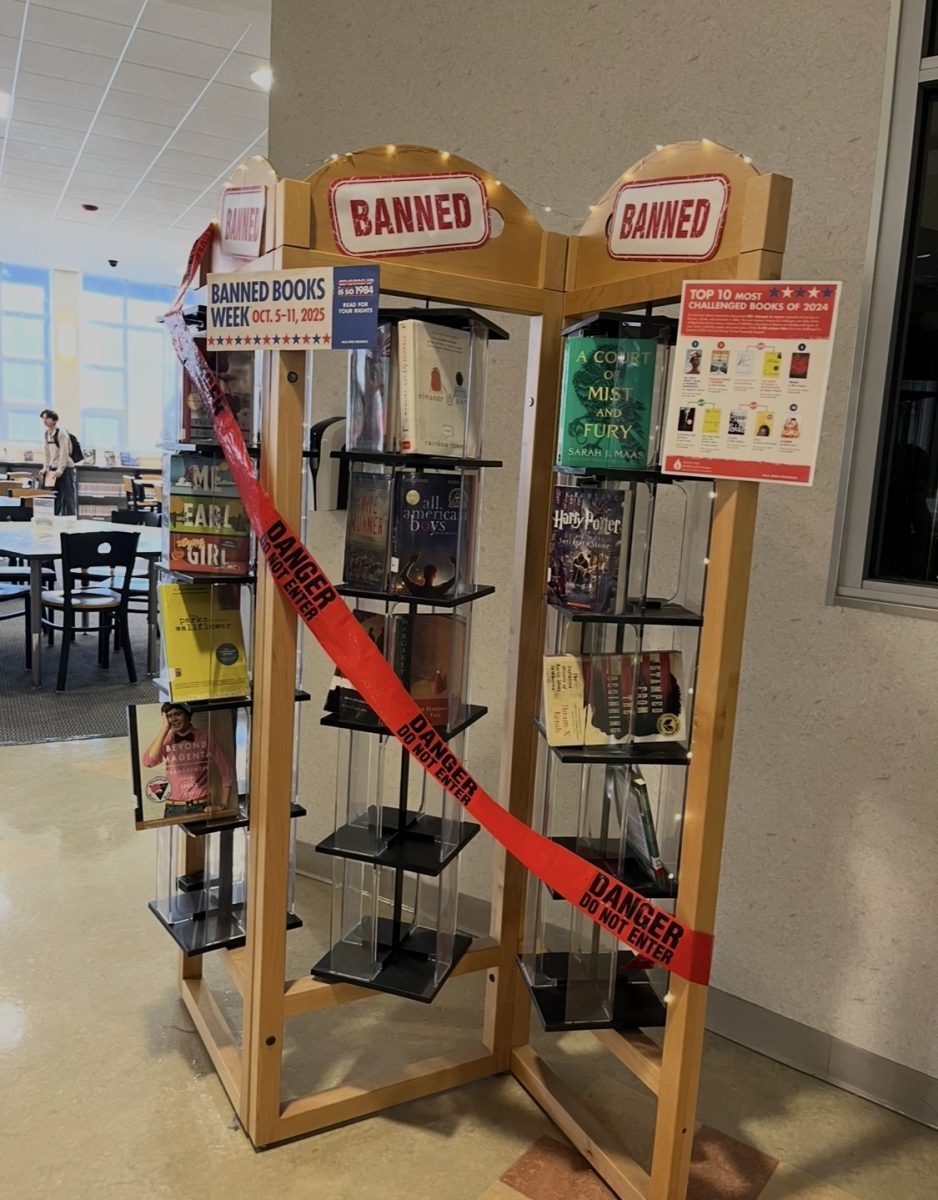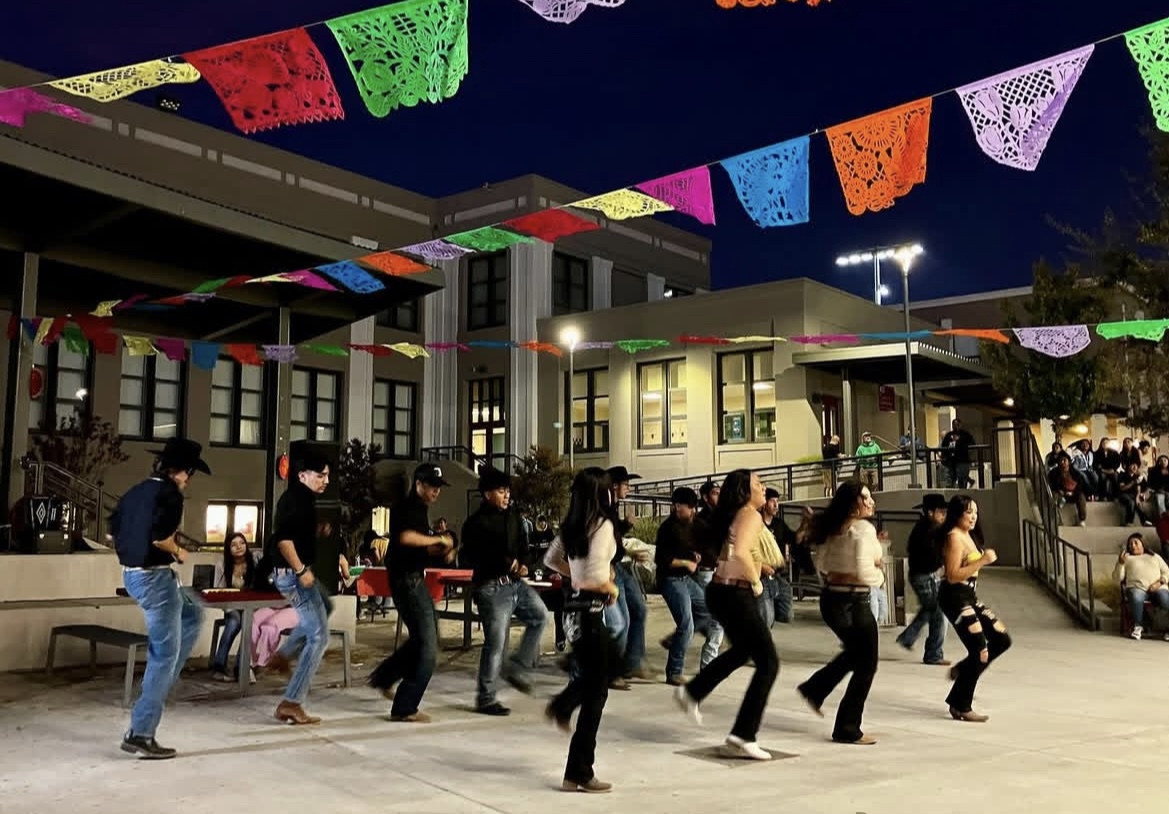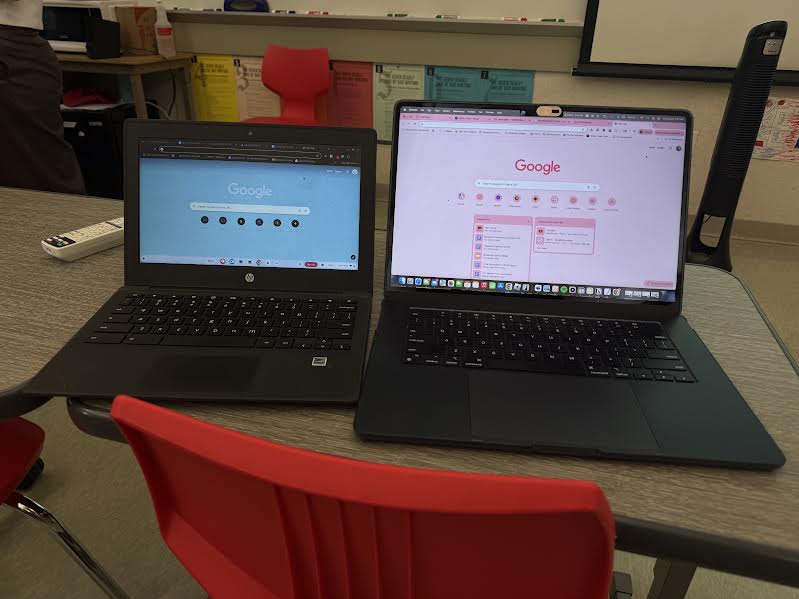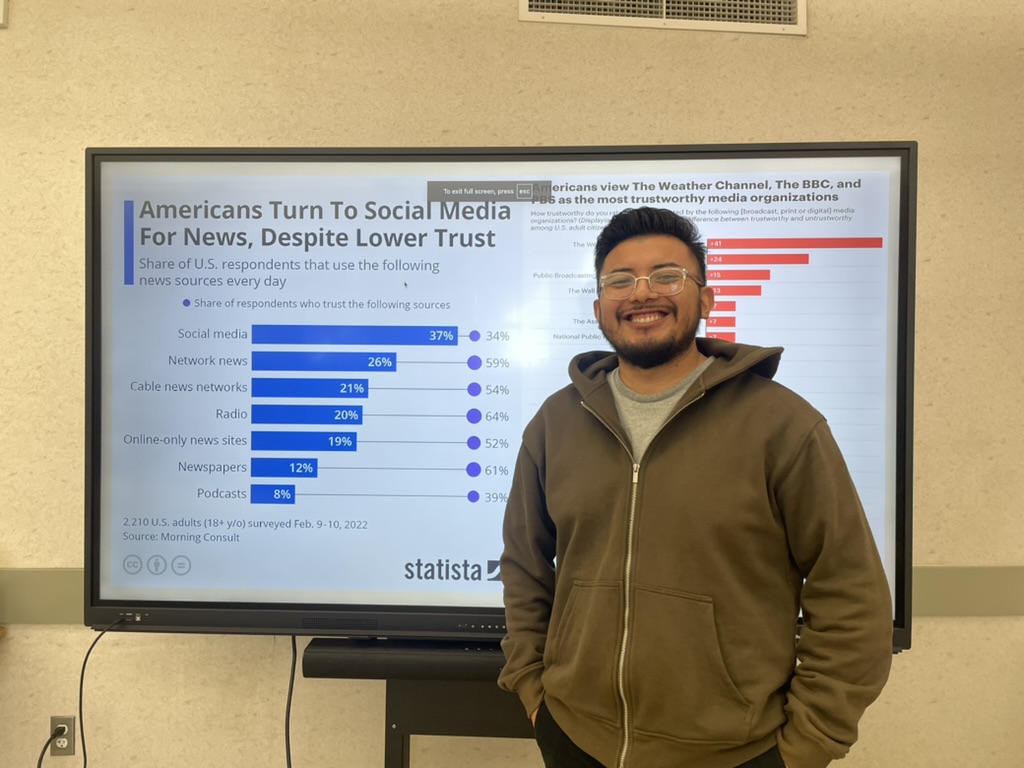In Ms. Spaelti’s third-period class, students are playing a heated game of Jeopardy to review for their upcoming test. To earn points for their team, students must answer questions like “What is a political party?” or “What is Gerrymandering?” Being a relatively low-stakes review, students become passionate about finding answers and convincing their teacher that their answer was similar to the revealed answer. Laughter breaks out as students argue with each other and interact with the game. Hosting the game is Mr. Morales, who also introduced this new fun way of studying.
Joseph Morales has been a student teacher at San Rafael High School since August 2024. This new face is bringing many ideas and experiences to the school and plans to work hard to support all his students.
When he was in 7th grade, Morales had a hard time fitting into his new school at James B. Davidson Middle School (DMS). Before moving, he had a circle of friends and peers that he loved in Novato but a sudden change influenced his middle school experience. Navigating a new school setting meant he would have trouble fitting in and adjusting. He described how his time at DMS was “bad in a way” because he “didn’t have support.”
Struggling to fit in and not having counselors to support him were memories of his 7th-grade experience, which would soon become one of the reasons he chose to become a teacher.
“Originally I wasn’t sure what I wanted to do,” Mr. Morales says about his plans after high school. He loved making films thanks to his participation in Media Academy. But he realized he needed a job and film was a career he couldn’t afford to chase. Through his friends, he got hired at DMS as an after-school teacher.
This temporary job would then solidify his motivation to become a teacher. While working at DMS, Morales noticed that many students from low socioeconomic backgrounds were being dismissed and not given the attention they needed. He observed that “a lot of kids were going through a lot” and, “there were a lot of negative things that were associated with school and I didn’t like that.” Inspired to create a change in his community, he approached his students with an open-door attitude, having a judgment-free environment and being committed to supporting them in any way possible.
Morales has taken the initiative and it can be seen as he’s currently studying to receive his master’s and teaching credentials. He mentioned that his program is dedicated to “transformative teaching” and providing students with the opportunity to continuously evolve. “I wanna step away from just the traditional ‘I speak and you listen’. I want to be more hands-on and energetic,” says Morales. He believes that creativity and having meaningful interactions with students is the most important thing about education. “That’s along the lines of my philosophy about education,” he says. His philosophy is all about adapting to the students, being interactive, and having fun in class.
His philosophy is evident through his lessons, which are designed not only to teach content but to make it applicable to everyone. An example of this was through an assignment he created involving social media. In this assignment, students were asked to create two social media posts about real current events. One post contained the real details of the event, while the other was nonfactual and illegitimate. With this assignment, Mr. Morales wanted to teach students how easy it is to spread misinformation on social media and how convincing it can look. He pointed out ways students can avoid misinformation, such as reading captions, looking at the username, or checking another source to confirm the news.
A student of Mr. Morales, Vanessa Lopez, says she liked the social media post assignment because it was something that related to her life. “He takes our interests into consideration to get us to participate more and make the class as interesting as possible,” is what she says. Vanessa was also a fan of the Jeopardy review game because it was “fun” and “a new way of learning that I had never seen before.”
At the beginning of the school year, Vanessa Lopez felt like Mr. Morales was quiet and timid. However, she felt comfortable with him from the beginning because, “he is young and has a similar background to all of us,” referring to his Hispanic heritage. Lopez shared that she became accustomed to his presence in class, adding that he “has built connections and tries to include everyone.” According to Lopez, his voice is projecting louder and he makes sure that everyone is receiving the help they need.
“His style is more like, this is something that is interesting to you and showing how your life can be affected by it or be connected to it,” says Ms. Spaelti. Incorporating history in a way that is digestible and relatable to teenagers is an aspect of Morales’ style. Stepping out of the traditional way of presenting information is how Ms. Spaelti describes his teaching method. “Like the games that we’ve done, he wants there to be an aspect of fun and there to be that it’s not just sitting there and taking notes and listening,” she says.
Ms. Spaelti has been Mr. Morales’ mentor and advisor through his student teaching process. Meeting regularly with him and working together to create a curriculum that works for everyone. She also helps him stay on track with both his own school and his work at San Rafael. In the short time that he’s been teaching she says, “he’s already improved a lot.”
“He’s gone from being a little bit quiet to having more of a teacher voice and having more command of the classroom,” she says. Just a few months into his first time teaching high schoolers Mr. Morales has already taken command of the classroom and has started to build meaningful connections with his students.
He’s been working especially hard with newcomer students. “I think that’s one of the main things I want to help the newcomer population,” Mr. Morales says. When he worked at Davidson he worked closely with newcomers from different countries. He saw that newcomers experienced ostracization because they were new and did not speak English. His students would often come to him because people would exclude them for not speaking English.
Ms. Spaelti also mentioned that he’s been working harder in Specially Designed Academic Instruction in English (SDAIE) classes. “As we’ve been going through the semester, he’s been able to see things that really are working and things that aren’t working,” she says. SDAIE classes focus on students with little to no English literacy. For that reason, Ms. Spaelti has struggled to adjust to their speed. While her CP classes cover more topics faster, her SDAIE classes have an altered pace. She says, “Sometimes I get impatient because I’m used to teaching CP classes. I think he’s been really good at being really patient and making sure that they clearly understand stuff before moving on to the next topic.”
True to his word, Morales prioritizes comprehension over speed, adjusting to the language barrier and finding ways to make learning easier. He’s been reforming the classroom and making it a space where everyone can learn. His SDAIE student Jennifer Vicente is appreciative of his great help in class. She says, “El Sr. Morales me ha ayudado a mejorar mi Inglés ya que él nos ha puesto a practicarlo y nos ayudado en darnos ejemplos fáciles para que podamos entender de los temas que hemos recibido con él.” She explains that Morales has helped her improve her English by giving her sample answers and examples which help her understand the topics they’ve received in class.
Jennifer also appreciates that Mr. Morales gives students papers with guides on how to complete their homework. Equipping his students with the basic tools for completing homework and not just expecting them to figure it out on their own is the type of support he gives his students.
According to Ester Rodas, his friend and high school peer (as well as my older sister), Morales is a rare gem in the teaching industry. “To come by someone who is actually passionate about teaching SDAIE is very rare,” she says. Rodas says Morales makes language barriers and other hurdles less impeding to his students’ education and it’s due to his genuine interest in helping the newcomer population. “He has the heart for them and realizes how much of a need there is for good teachers who are willing to work with them. Because not every teacher wants to or even can,” she says.
Rodas describes him as “one of the most caring, disciplined, and determined” people she’s ever met. Since high school, Rodas has kept contact with Morales and was thrilled when he decided to become a teacher, like herself. Mentioning that Morales is one of the few students in her class of 2017 cohort to actually “fulfill a dream.”
“Many just gave up or became too difficult for them. Even if it took him a little bit longer to navigate that system. He did it.” she says. Morales’ headstrong character is what distinguishes him from the crowd. Rodas believes that kids are going to love having him because he’s a great role model. She doesn’t doubt that he’s going to inspire many male students and students in general to keep going in school.
Many teachers with years of working experience are still trying to figure out what Morales already understands. Although Mr. Morales has only been on campus for roughly one semester, he wants to give newcomers the same support and opportunities as anyone else, sparking an enjoyment for learning in kids, a “community of learners.”







































